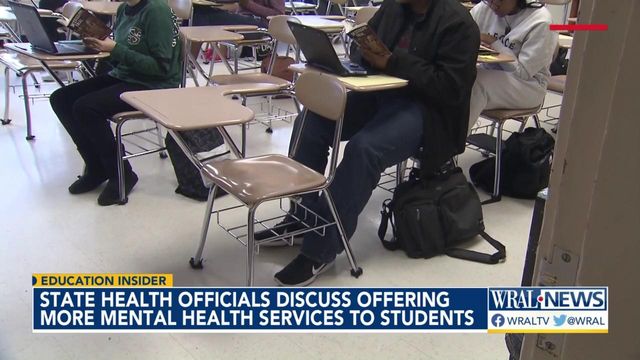NC education and health officials propose teletherapy program in schools
The pilot program would be part of a new action plan to address children's mental health.
Posted — UpdatedThe request is among several the departments are jointly making to expand mental health training and support at the state’s K-12 schools, as data for years has shown a continual rise in suicidal thoughts and behaviors among young people.
“And yet, it’s been obvious for years that we need more” support, Carper said. She said that increase “never feels like it’s happening” and asked if the state had a plan to provide more.
Moments later, the department unveiled a draft plan for gradual changes and some grants to retrain people to become school mental health professionals.
Carper said teachers and students would be better off if teachers could focus on instruction and mental health professionals were more available to work with students who need help.
“We’re just barely at the tip of the iceberg with what the need is,” Board Chairman Eric Davis said Wednesday. “We’re fully behind getting our students what they need so they are healthy and you can teach them.”
About 10% of school systems also provide telehealth services for either physical or mental health, according to DHHS. Most of the services are for physical health.
The departments also want $4 million to continue its existing Project AWARE/ACTIVATE pilot program. The program operates in six school districts and works to expand mental health services for students that take place at school, develop partnerships in communities to provide services and develop policies designed to improve behavioral health. According to DPI, the program has resulted in reduced suspensions and more mental health screenings and services. The six districts that participate are Beaufort, Sampson, Rockingham, Nash, Sampson and Jackson county school systems.
One grant will go toward paying tuition for existing general counselors and general social workers to train them to work in schools. It would not fund more school counselors or school social workers but would rather fund existing counselors and social workers — not employed by schools — to become qualified to work in schools. The grant could fund education for 60 school counselors or school social workers in eight pre-selected school districts: Pitt, Pender, Wayne, Harnett, Scotland, Alamance-Burlington, Charlotte-Mecklenburg, and Catawba school systems.
The second grant would also retrain some professionals to be “school-based mental health providers.” It would target six pre-selected school districts: Cabarrus, Davidson, Guilford, Randolph, Scotland and Stanly county school systems. It could support retraining for about 30 professionals and provide funding for recruitment and retention, such as internships or salary supplements.
North Carolina's ratios of students to support professionals — such as school counselors, social workers, nurses and psychologists — continue to be much lower than national groups for those professionals recommend.
Related Topics
• Credits
Copyright 2024 by Capitol Broadcasting Company. All rights reserved. This material may not be published, broadcast, rewritten or redistributed.






